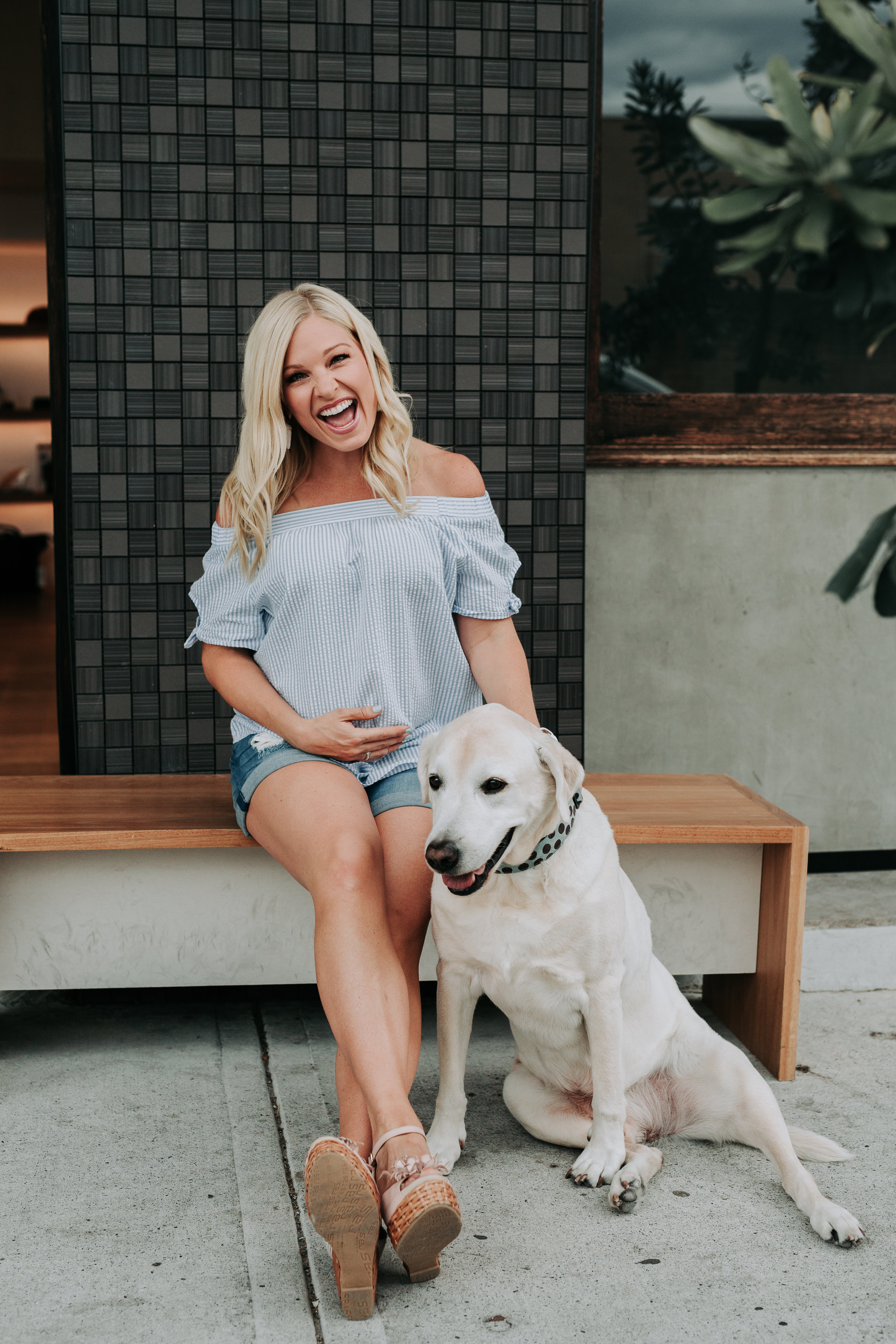How to Prep Your Pup for Baby's Arrival
Photos: Anna Kooiman, Bondi Beach, Sydney Australia, Kath Mclean
Photos: Anna Kooiman, Bondi Beach, Sydney Australia, Emma Wand
As I count down the day's until may baby's arrival, I can't help but wonder what it will be like to have my first born 'real' baby meet my first born 'fur' baby! HaHa I want to make sure the transition is as smooth as possible. Baxter is a 100 pound yellow lab that has been my rock for nearly 11 years. I’ve had BaxMan since he was a few weeks old. He’s lived with me in Ohio, North Carolina, three New York City apartments, San Francisco, & now Sydney, Australia. He is one cool pup.
As I imagine most of you at home would agree, these fur babies truly are part of the family, aren’t they? So what happens when our families expand? How do our animals react to the new pecking order? What can we do to ensure our homes are not only safe environments, but also happy environments, free of unnecessary tensions?
Below you will find a Q and A with Baxter's doctor from Bondi Vet, Dr. Kate Adams. Dr. Adams is one of the brilliant vets who helped save Baxter from the infamous corn cob that nearly took his life a couple months ago. Read the piece I wrote for Fox News here.
I have found Dr. Kate's answers very useful in my quest to make my home both baby and doggy friendly. I hope her answers resonate with you or someone you know!
ANNA: Can our dogs tell when we get pregnant? Does it depend on the breed? Age? Temperament?
DR. KATE ADAMS: It’s never been scientifically explored however it is definitely possible. Dogs are really good at detecting a change in smell. But not just smell, they can also pick up on pheromones which are chemical signals transmitted to send signals. There have been studies to show dogs that are able to pick up scents and detect cancers very accurately. In some cases, dogs have shown to almost be 100% accurate at detecting particular cancers in people.
There are many amazing anecdotal reports of dogs who’ve become more protective of owners that are pregnant. They have really remarkable senses and can detect even subtle differences in the world around them. While this may be a pheromone change it could also be a behaviour change – or a change in the environment around them.
ANNA: What can new parents do ahead of time to prepare the home to be safe for the dog and newborn?
Photos: Anna Kooiman, Bondi Beach, Sydney Australia, Kath Mclean
Photos: Anna Kooiman, Bondi Beach, Sydney Australia, Kath Mclean
DR. KATE ADAMS: Your dog is going to have to adjust in a change in the household rank once your new baby arrives so start making incremental change before the arrival of the baby. So for example, if your dog sleeps in your bed, you might want to start to change that pattern well before the arrival of the baby. If you can’t get your dog to their favourite park everyday at 5pm like you used to, start to mix it up so they stop expecting the 5pm park.
Start to get your dog used to walking beside the pram so that they know what to do once the baby arrives. You might look ridiculous, but the last thing you want is them pulling the pram along when there is a real baby in it!
Start touching your dog. Get them used to pulling, prodding and poking with positive rewards (that is, making sure they get treats). Get them comfortable with having their paws touched, their ears, lips and nose played with. Some dogs won’t be a s tolerant but it’s important to know your dog and their boundaries ahead of time. The consequences of having your child bitten are very bad, so you need to do your best to get them comfortable with touch ahead of time- as well as knowing their boundaries.
Photos: Anna Kooiman, Bondi Beach, Sydney Australia, Emma Wand
Get help if you need it. If your dog isn’t very well behaved, this is only going to be potentially disastrous for you when you have a baby (or at very least frustrating when you’ve had no sleep). It could be something as serious as growling when they are near their food, or something less serious as jumping up on you or stealing food. If you are struggling with behaviour then seek help. It’s really important you have good verbal control of your dog – and they listen! Get yourself some help from a behaviourist ahead of time – even if they can’t fix the issue immediately, and it may take time and effort to fix, having a relationship with a behaviourist that knows your dog ahead of time can be very helpful.
Get your dog vet checked. Sounds like not much but you really need to know if your pet has any underlying health conditions ahead of time. So for example, making sure they don’t have a sore tooth you don’t know about (which can make them grumpy!) or sore legs (or arthritis) you could potentially be doing something about (and again, can potentially make them less tolerant than they normally would be of particular things). Some dogs have anxiety that needs medication. I often hear people reluctant to use medication to help with their dog’s anxiety and want to use natural alternatives like rescue remedy instead. The analogy I have is when you have an anxiety disorder, and your put in a situation where you have to go and speak in front of 1000 people, you can pour a whole bottle of recue remedy down your throat, and it won’t make a shred of difference (you may get a stomach ache though!). So talk to your vet about your anxious dog - if your vet feels like you might need medication such as anti-anxiety medication for your dog, try it. It can help a behaviourist get better results and make life so much better for you and your anxious dog. You also need to get some advice to ensure you are doing appropriate preventive care before the baby arrives – things as simple as making sure your dog doesn’t (and isn’t going to get) worms or fleas (and introduce them to your home).
Photos: Anna Kooiman, Bondi Beach, Sydney Australia, Emma Wand
Set up a child free zone in your home. Your dog needs some space to call their own – a place they can go to get away (you all do really!)
ANNA: How do dogs typically react as soon as the baby gets home? Do they typically get jealous? Confused? Protective? Submissive?
DR. KATE ADAMS: When you first bring your baby home your home is going to be full of new sights, smells and sounds – not to mention the change in your behaviour and routine. It’s normal for dogs, especially that those that haven’t had much contact with children, to feel anxious and a little confused. It’s really important at this stage not to just shove your baby in front of your dog’s face. You need a plan, and that’s to slowly incrementally allow your dog to get closer – but not all in one day!
Photos: Anna Kooiman, Bondi Beach, Sydney Australia, Kath Mclean
ANNA: Dogs are pack animals, as the pack changes within the house, do the dogs make any long term behaviour changes?
DR. KATE ADAMS: It really depends on the individual household and how well prepared you are. Behaviour changes can be life long – and that behaviour change can be for the better.. or for the worse. So for example, an anxious dog, may become snappy – something they didn’t o beforehand and that behaviour change isn’t going to fix itself. It could very well become a long-term issue. Equally, your dog can actually become more tolerant and obedient - especially if you put the work in!
ANNA: What special things do we need to do for our dogs to make sure they are okay with the new pecking order?
DR. KATE ADAMS: You need to ensure you have good verbal control of your dog and the rules of the house are in place. Dogs respond well to positive reinforcement (treats!) so make sure you have plenty to make sure your dog feels like it’s a great experience, even when they can’t get on the couch anymore.
Always supervise your children with your dog. Even trustworthy dogs – because you never know what your baby or child might do to the dog when you’re not looking. I once had a case of a dog mauling a child, it was really sad as the dog had to be euthanised and the baby was in intensive care. The owners were in such shock as the dog had never shown any signs of aggression previously. On autopsy, a small pencil was found lodged in the dog’s ear drum, presumably put there by the baby when the owners back was turned. In fact, it had gone down so far, it had gone all the way through the ear drum which would have been horribly painful for the poor dog. The result – the dog attacked the child leaving scars and injuries for life, and the dogs life ended. It was very sad. The point is, sometimes making sure they are ok with the pecking order, isn’t enough. Even if they are - they still need supervision.
Photos: Anna Kooiman, Bondi Beach, Sydney Australia, Emma Wand
Teaching respect to your children, and the dog is also important. Children need to be shown how to pat your dog – not pulling their fur, climbing on them or putting their face up in theirs. Equally, dogs need to be shown how to interact gently with children, not chewing on your hands even in play and taking treats without snapping your hand off.
Yelling at your dog (or your child) often doesn’t accomplish much. It makes everybody feel bad and ruins the bond and relationship you have – it’s no different with your dog.
The aim is to have your new baby and your dog live together. Honestly, there are so many benefits to a household with dogs for your children, so what that doesn’t mean is shoving your dog outside and never patting them again (and then 12 months in, placing ads on gum tree saying ‘free to good home, needs someone who can give him love and attention). And in fact, dogs are a great way to practice for children. In my practice I often see people with amazing dogs, often have pretty amazing children… and unfortunately the same is true in reverse. So, if you have a badly behaved or chaotic dog, you might want to work on getting that sorted just to actually practice for your child!










